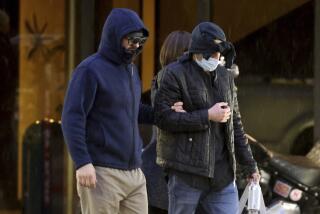U.S. Envoy Accused as Spy Recruiter : Russia: A Moscow entrepreneur says his business suffered after he turned aside an embassy staffer’s requests he work for ‘intelligence service.’
- Share via
MOSCOW — One of Russia’s most prominent young entrepreneurs Monday publicly accused an American diplomat of trying to recruit him and two of his colleagues to work for the CIA, but he declared that “not everything here can be bought.”
Entrepreneur German Sterligov complained in a letter to U.S. Ambassador Robert S. Strauss that two of his employees had been refused visas to visit America and that the Wall Street office of his firm, Alisa, has been harassed by FBI agents.
“I know, Mr. Ambassador, that these facts are connected to our refusal to cooperate with the CIA,” Sterligov said in the letter. “We are now being taught a lesson, and this may cost us dearly.”
John Ohta, the U.S. Embassy spokesman, confirmed receipt of Sterligov’s letter but said that “the allegations are totally groundless.”
The young businessman said that during a dinner conversation at the Peking Restaurant in Moscow, David J. Whiddon, a diplomat with whom he had had a few previous conversations, asked him to supply information for “the intelligence service.”
“I laughed,” Sterligov, whose trading company has offices in several Russian and overseas cities and who also runs exchange markets for building materials, said in a telephone interview. “I tried to make a joke out of it.”
But it was clear, he stressed, that the diplomat was serious.
In his letter to Strauss, a copy of which he gave to The Times, Sterligov said Whiddon not only asked him to work for the CIA but also “directly and crudely” said that if Sterligov agreed, “Alisa would not have any problems with its activities in the U.S.A.”
Sterligov said the diplomat had previously supplied him and his family with visas without making them go through the normal application procedure, a favor that Sterligov said “seemed strange” to him.
The diplomat did not give up after the refusal, Sterligov alleged. He continued to invite Sterligov to other social engagements, but the entrepreneur said he declined each one. Two of Sterligov’s colleagues, however, went horseback riding with Whiddon in the countryside outside Moscow and said the diplomat made similar suggestions there that they collaborate with the CIA, Sterligov said. They also refused, he added.
Subsequently, two Alisa employees, members of its security staff, were denied U.S. visas when they sought to accept an invitation to take part in an international kick-boxing championship. Asked about those refusals, embassy spokesman Ohta said: “All employees of Alisa who are found to be eligible to receive” visas are given them.
The affair seemed like a strange echo of the intelligence scandals common in Moscow during the Cold War era, when Soviet authorities frequently accused diplomats and journalists of espionage activities. But Sterligov was certainly the first of Russia’s new businessmen to make such an accusation.
In contrast to past practices, Whiddon was not immediately declared persona non grata and expelled. Reached by telephone, Whiddon, a junior diplomat who works in the non-immigrant visa section, said: “I know nothing about it. All that I know about Alisa is that they receive visas here.”
In another hangover from the Cold War era, a Russian intelligence official tried to clear the name of a former CIA agent who was based at the U.S. Embassy in Moscow in the early 1980s and later defected to the Soviet Union.
Yuri Kobaladze, head of the press bureau of the Russian foreign intelligence service, told the Itar-Tass news agency that Edward Lee Howard, who defected to the Soviet Union in 1986, did not collaborate with the Soviet KGB before he received political asylum here.
“The Soviet intelligence service learned about Howard only after he asked for political asylum in the Soviet Union,” he said.
Howard, who moved to Sweden in November as the Soviet Union was falling apart, returned to Moscow last week to avoid pressure by American officials seeking to return him to the United States to stand trial, Kobaladze said.
More to Read
Sign up for Essential California
The most important California stories and recommendations in your inbox every morning.
You may occasionally receive promotional content from the Los Angeles Times.












